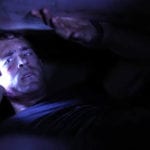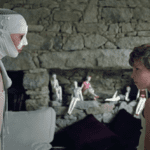 Movies and TV
Movies and TV  Movies and TV
Movies and TV  Creepy
Creepy 10 Lesser-Known Shapeshifter Legends from Around the World
 Animals
Animals 10 Amazing Animal Tales from the Ancient World
 Gaming
Gaming 10 Game Characters Everyone Hated Playing
 Books
Books 10 Famous Writers Who Were Hypocritical
 Humans
Humans 10 of the World’s Toughest Puzzles Solved in Record Time
 Mysteries
Mysteries 10 Scientific Mysteries We Don’t Fully Understand
 Weird Stuff
Weird Stuff 10 Celebrities Who Have Admitted to Alien Encounters
 Our World
Our World 10 Surprising Secrets of Notre Dame Cathedral
 Miscellaneous
Miscellaneous 10 Intriguing Origins of Popular Carnival Rides
 Movies and TV
Movies and TV 10 Actors Dragged out of Retirement for One Key Role
 Creepy
Creepy 10 Lesser-Known Shapeshifter Legends from Around the World
 Animals
Animals 10 Amazing Animal Tales from the Ancient World
Who's Behind Listverse?

Jamie Frater
Head Editor
Jamie founded Listverse due to an insatiable desire to share fascinating, obscure, and bizarre facts. He has been a guest speaker on numerous national radio and television stations and is a five time published author.
More About Us Gaming
Gaming 10 Game Characters Everyone Hated Playing
 Books
Books 10 Famous Writers Who Were Hypocritical
 Humans
Humans 10 of the World’s Toughest Puzzles Solved in Record Time
 Mysteries
Mysteries 10 Scientific Mysteries We Don’t Fully Understand
 Weird Stuff
Weird Stuff 10 Celebrities Who Have Admitted to Alien Encounters
 Our World
Our World 10 Surprising Secrets of Notre Dame Cathedral
 Miscellaneous
Miscellaneous 10 Intriguing Origins of Popular Carnival Rides
Top 10 Films About Economic Disaster You Really Need To Watch
There are lots of films that celebrate money. People finding money, making money, even stealing money. Films about losing money are less popular, for obvious reasons. Who wants to think about that, right?
10 Fascinating Economic Collapses Through History
There have been many documentaries about economics. From those serious documentaries with lots of graphs showing downward trajectories and long tracking shots of silent streets, to reality TV shows like The Queen of Versailles, following the building of a mansion by a spendaholic wife and a husband whose business is on the brink of disaster, which makes compulsive viewing. Like a car crash in slow motion.
Great movies about losing money are much rarer. But here are 10 movies that we think are worth a watch.
10 Rollover
Perhaps not one of the greatest movies in the world, after all Kris Kristofferson did win a Razzie for Worst Actor for his role as the president of a bank. Jane Fonda co-stars as the widow of a chemical company owner, whose husband died suddenly after discovering a secret slush fund with the ‘sinister’ account number 21214.
Kristofferson’s bank is doing badly. So badly, in fact, that if he cannot find a single customer with a lot of money to invest, they will go broke. It doesn’t seem to occur to them that they could achieve the same end from a lot of customers investing a small amount, but hey.
In walks Fonda. If only they can get their hands on the secret slush fund, they will both be saved. There’s a lot of guff about finders fees, and other pseudo-financial rubbish that makes us think that maybe the screenwriter wasn’t that clued up on the world of finance.
When the pair traveled to the Sahara Desert in order to negotiate with some Bedouin financial investors, our suspicions were confirmed. Even back in 1981, millionaire sheikhs had phones and held meetings in offices.
The film’s real interest is in gold. The secret slush fund is actually a massive big pile of gold, hoarded against the possibility of financial collapse. When its existence is made public, people around the world begin to riot when they discover their money is now worthless (OK this link is not very clear in the film and most countries’ currencies are not, in fact, tied to gold). But the scenes of the breakdown of civilization are interesting.
The final scenes make it worth the effort. We see Fonda’s chemical factory standing idle, its workers laid off, and Kristofferson’s bank is the same. And this is mirrored around the world as the catastrophe of financial collapse rolls over the world like a sandstorm in the Sahara.
9 Rogue Trader
13 years before the global financial meltdown, 1 single trader gave the financial world a foretaste of what was to come, and, as with all disasters, the story was made into a movie. Rogue Trader starred Ewan McGregor as Nick Leeson, a derivatives trader for one of the world’s oldest banks.
Leeson is the manager of their Singapore arm, where no one actually checked what he was doing.
Or how much he was losing. Which was a lot.
He viewed the stock market as ‘one giant casino’. After an initial winning streak, Leeson began to lose money, and hid the losses in a secret account.
And no one noticed. Until the bank was down £830 million and the bank went bust, almost bringing down the London Stock Exchange with it. The story was gold dust, but the movie was not so well received, and, like its subject, lost a lot of money.
8 Boiler Room
“Anyone who tells you money is the root of all evil doesn’t have any”. So says Ben Affleck, who runs his own brokerage firm, JT Marlin. Really?
Giovanni Ribisi is the inexperienced new trader sucked in by the promise of easy money.
The brokers are all young and ambitious. They can all quote lines from Wall St, and see Gordon Gekko as a role model. After some time selling shares, and enjoying the spoils, Ribisi begins to feel that something is not quite right at JT Marlin. Apart from the name.
The firm employs sharp practices to inflate demand for penny stocks. They even create fake companies and sell shares in them too at inflated prices.
Ribisi finally realizes that real people are being hurt by their scams when he persuades one of them to invest his meager savings in stocks which then tank. He begins to work with the FBI to bring Affleck and his company down, copying all their files, and in a small act of atonement, he persuades his boss to repay the investor who Ribisi had conned.
The film showed just how exciting the world of finance can be when everyone is making money.
And why, when there is so little control over what they do, some people don’t know where to draw the line.
This film is the original “Wolf of Wall Street” with both movies being loosely based on the life of Jordan Belfort.
7 Margin Call
Margin Call tries to put a human face to Wall St. It’s probably fair to say the final film doesn’t quite meet the brief. It follows a fictional firm over the course of a single day, and shows how their actions in dumping their stock precipitated the crash.
Stanley Tucci, a risk management guy, is made redundant and passes on his concerns about the impending financial crisis on his way out the door. Jeremy Irons plays the CEO of the bank, who decides to cut and run.
At the emergency board meeting, Irons says, “There are 3 ways to make a living in this business. Be first, be smarter or cheat.” Being bankers, not criminals, they decide to go with option 1. Irons orders his staff to sell off their shares, thus precipitating the stock market crash.
Kevin Spacey, as the COO, makes a big speech to his brokers that is just a little hard to swallow. He says he is ‘very proud’ of the work of his brokers, who have “dedicated a portion of their lives” to making themselves lots of money. Or, as Spacey put it ,“our talents have been used for the greater good”
In fairness, his trader’s did look devastated at the thought of the impending worldwide financial collapse, at least until he promised them a million-dollar bonus if they managed to off-load their worthless shares onto unsuspecting schmucks before the markets caught on.
Heroes, all of them.
Stanley Tucci heroically returns for the final day’s trading, in order to say, ‘I told you so’ and negotiate hard over his severance package. Kevin Spacey is disgusted with the behavior of his firm, and devastated by the effects of Corporate Greed, but, in a touching moment of genuine pathos, he is eventually persuaded to stay in his very well-paid job, because, ‘I need the money’.
That’s OK then
6 99 Homes
Most movies about the financial crash are centered on Wall St, and the money makers, which is understandable. 99 Homes looked at the situation from the other end – all those people whose homes were repossessed when the housing bubble burst.
While the Wall St films were all frenetic energy, champagne and billion-dollar deals, 99 Homes looks at what desperate people will do to put food on the table and keep a roof over the heads of their kids. Andrew Garfield stars as a first-time buyer who loses his home after he is made redundant.
The real-estate developer who evicted him, played with chilling coldness by Michael Shannon, offers Garfield a job evicting 99 other people from their homes.
And Garfield sold his soul to the devil, and evicted his neighbors, until one of the neighbors fought back.
99 Homes is not a feel-good movie, but does put a human face to the sub-prime mortgage scandal.
10 Famous Props And The Actors Who Stole Them
5 Too Big to Fail
What would government do when banks fail? This was the premise of Too Big to Fail, the story of the US Treasury’s response to the financial collapse of 2008.
Starring William Hurt as the Treasury Secretary and Paul Giamatti as the Chairman of the Federal Reserve trying to save the world in a Gucci suit.
(Spoiler: They failed)
If Hurt and Giamatti are the superheroes, who are the villains? Well, there’s James Woods, who plays the CEO of Lehman Brothers, Richard Fuld, who refused to acknowledge the end of the world was nigh, and kept right on hustling until the collapse. In one excruciating scene, the Lehman brothers staff maneuver to keep Fuld away from the negotiating table as they work with a Korean consortium to fund a buyout, only for Fuld to crash the meeting and try to drive up the price.
The Korean’s walked, and Lehman’s folded.
The film had a good go at making the difficult subject of finance interesting. It’s not easy to inject drama into what is, essentially, an endless round of meetings, and there are an awful lot of shots of men in suits striding purposefully down corridors, but the film does manage to convey the seriousness of the financial situation, even if it doesn’t quite manage to explain how we got there.
The film’s end carries a note of warning, when William Hurt points out that the billions of dollars in bail out funds is simply being handed to the same people who caused the crash, without any restrictions on how they will use it. Which is disturbing.
Even more disturbing, the film said, is that as a result of mergers following the crash, the top 10 financial institutions in America now hold 77% of US banking assets, making them, once again, too big to fail.
And don’t even get me started on the massive bailout bill that just got passed by Congress and the Senate under the cover of saving us from the Coronavirus.
4 Wall St (1 and 2)
Gordon Gekko made finance sexy in Wall St. The Oliver Stone film captured the 1980’s zeitgeist of ‘Greed is Good’. Starring Michael Douglas as seasoned financier, Gekko, and Charlie Sheen as Bud Fox, a newly qualified stockbroker not yet wise in the ways of the stock exchange, the film examines the way Wall St often blurred lines and traded off inside information in order to line their own pockets.
In a ridiculously naïve move, Bud persuades Gekko to buy an airline, and hopes that the famed destroyer of companies will expand this company, and make Bud its new CEO.
Gekko breaks it up and sells it for parts. Which is kind of awkward for Bud, given that his dad works there.
Although both Gekko and Bud are arrested for insider trading at the end of the film, the enduring message of the film was, indeed, that Greed is Good, and many stockbrokers subsequently credited the film as the reason they went into finance.
Oliver Stone took another look at Wall St almost 25 years later, and focused on the stock market crash. Gekko, now released from prison, is making a living by warning of an impending economic disaster. He is a changed man.
And Shia LeBeouf is the newbie stockbroker. You can see where this is going, can’t you?
The sequel didn’t capture the spirit of Wall St in the crash quite so well as it had done during the champagne and cocaine years, perhaps because a repentant
Gordon Gekko just didn’t play well, but no list of films about Wall St would be complete without Wall St, so we’ve included the sequel, just so we can include the original.
3 The Damned
La Caduta Degli Dei (The Fall of the Gods), also released under the title The Damned, was a pretty strange 1969 Italian-German made movie, in English, about a rich industrialist family who start doing business with the Nazis, despite their opposition to the Nazi ideology. After a murder and an arrest, the family business is passed to relatives with even fewer scruples.
The film demonstrates the incestuous relationship between business and politics, as well as quite a few other types of incestuous relationships, and how control over one can affect the other.
It also shows how narrow is the void between success and disaster. In only a few months the family go from lavish, not to say excessive, living, to losing their home, business and even their lives.
Better than no other, this film depicts the transition from life under a failed bankrupt Weimar Republic to the powerful Nazi state. Director Luchino Visconti illustrates this masterfully through the central character, Martin, who starts out dressed in drag performing burlesque, and ends in a full Nazi uniform giving the Heil Hitler salute.
If you ask yourself where our current society sits on the scale of Weimar to Nazidom, the answer may frighten you.
2 The Big Short
Hands down the best film about the financial collapse, The Big Short concentrated not so much on what was done to try to prevent the collapse, but how we got there. It manages to explain complicated, and rather dull, financial concepts in ingenious ways. Such as Margot Robbie sipping champagne in a bubble bath, while explaining what a sub-prime mortgage is. “Basically, whenever you hear ‘sub-prime’, think ‘shit’.”
There are a lot of bad guys in this movie, but very few good guys. Steve Carrell plays Mark Baum, a fictional character based on Steve Eisman, the man who shorted Collateralized Debt Obligations (see Selina Gomez at the blackjack table for explanation) or Michael Burry, played by Christian Bale, who recognized early on that the market was unsustainable, and bought Credit Default Swaps as a result.
But they both profited from the collapse, so hard to picture them as actual superheroes.
The movie is pretty entertaining, for a finance movie, and has cameo appearances by the dozen, including Brad Pitt as a bearded trader-guru passing on his ancient financial wisdom to the young bloods. It won an Oscar for best adapted screenplay, and was nominated for Best Picture, Best Director and Best Supporting Actor, for Christian Bale.
Which is not bad for a film about mortgages.
1 The Grapes of Wrath
Long before the 2008 banking collapse, there was the Great Depression. John Steinbeck wrote the defining novel of the era, The Grapes of Wrath, which was made into a film by John Ford in 1940. The film was rather less bleak than the novel, and tried to end on a note of hope, when Ma Joad says, “We’re the people that live. They can’t wipe us out, they can’t lick us. We’ll go on forever, Pa, cos we’re the people.” Which has a flavor of Gone With the Wind about it.
I swear, I’ll never be hungry again.
Despite its rather upbeat ending, the film, which starred Henry Fonda as Tom Joad, is still considered not only one of the best films about economic depression, but one of the best films ever.
In a brilliantly concise explanation, one ‘labor agitator’ explains why bosses encouraged mass migration to join the California labor force. ‘Maybe he needs 1000 men, so he gets 5000 there, and he’ll pay 15 cents an hour and you guys will have to take it because you’re hungry.’
The film won Best Director Oscar for John Ford, and was nominated for 6 more.
10 Movies You Had No Idea Were Filmed In The Wrong Locations








